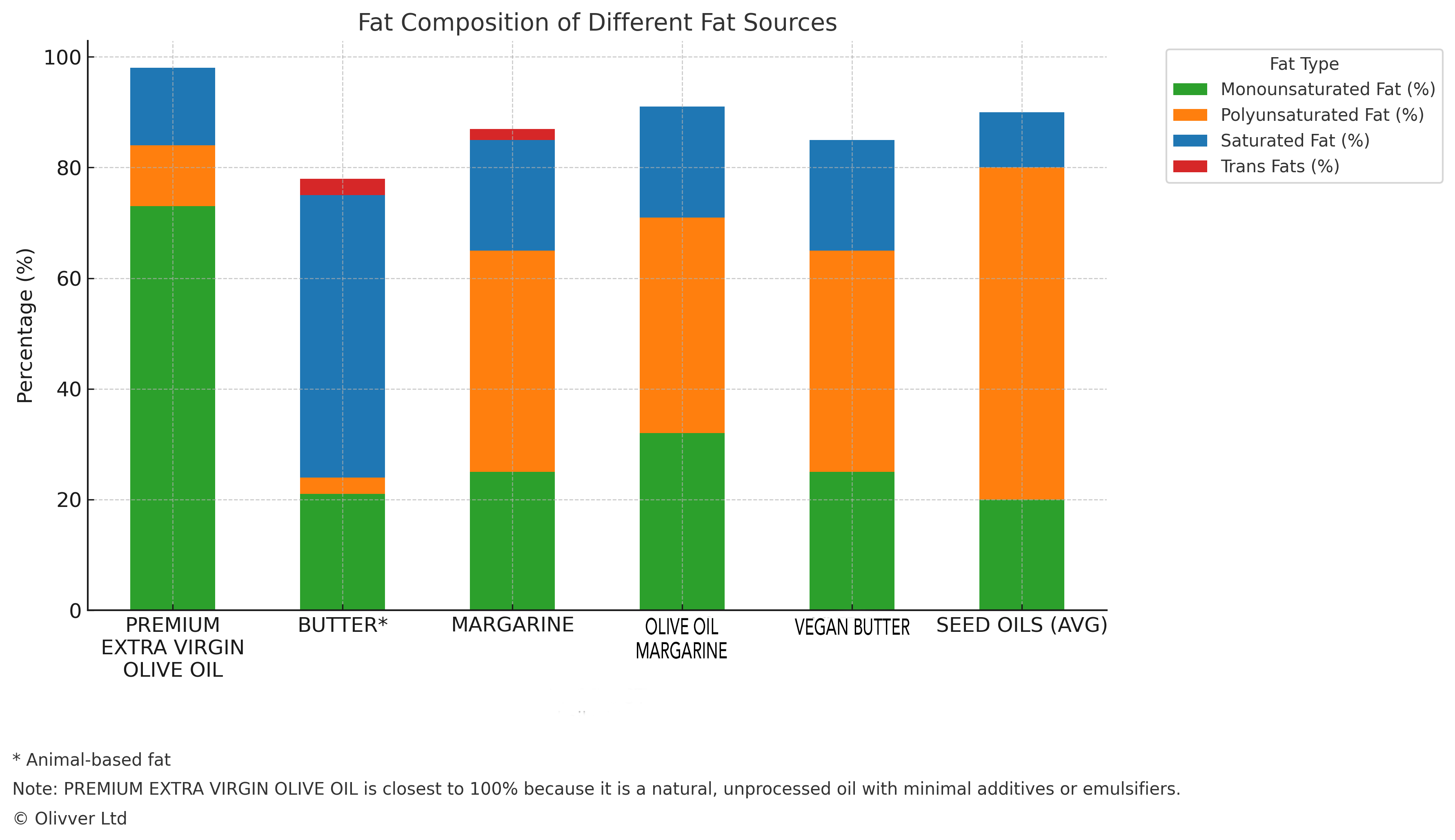
Are we being 'fat-washed'??
Dietary Fats and the Role of Extra Virgin Olive Oil
Dietary fats are essential nutrients that play a vital role in the human body. They provide energy, support cell growth, protect organs, help absorb certain vitamins (like A, D, E, and K), and are crucial for hormone production.
While fats have often been misunderstood in nutrition, current science emphasises the importance of fat ‘quality over quantity’.
And there’s no doubt, the healthiest fat source is certified extra virgin olive oil (EVOO), a cornerstone of the Mediterranean diet.
But it's hard terrain to navigate; it feels like almost every day another type of fat is being promulgated as the 'one', whether it's tallow or margarine cleverly eco-spun to look like a product rich in olive oil.
For example, one popular brand of 'olive oil' margarine found in New Zealand is comprised, in addition to an extremely modest olive oil content, of canola oil, sunflower oil and palm oil.
(As a side note, we're not big fans of the game of comparative marginalization either – undermining one group to highlight another. It's not always useful. A fat like butter, which we make so well in NZ, has a role to play, it's just that in our view it's like chocolate, enjoyed judiciously!)
Meanwhile it's hard to ignore the research into the benefits of high quality EVOO, which is extensive and ongoing. And the evidence is overwhelming that high polyphenolic extra virgin olive oils provide extraordinary heath benefits.
Let's drill down a little…
Fats are categorised into four main types: saturated, monounsaturated, polyunsaturated and trans fats. EVOO is predominantly composed of monounsaturated fats, which account for about 73% of its total fat content, primarily in the form of oleic acid.
Oleic acid has been linked to reduced inflammation, improved heart health, and better insulin sensitivity. It is more stable than polyunsaturated fats, making EVOO relatively resistant to oxidation during cooking and storage. (Side note - picuals are generally considered the highest oleic acid content EVOOs)
In addition to monounsaturated fats, EVOO contains about 14% saturated fat and around 11% polyunsaturated fat, including omega-6 and a small amount of omega-3 fatty acids.
While polyunsaturated fats are also essential for health, they are more prone to oxidation, especially when exposed to heat. The relatively low amount of these fats in EVOO contributes to its chemical stability and suitability for cooking, including at higher temperatures.
What sets premium, certified extra virgin olive oil apart from refined oils is not just its fat composition, but also its abundance of bioactive compounds, including polyphenols, tocopherols (vitamin E), and phytosterols. These compounds offer powerful antioxidant and anti-inflammatory effects that further enhance the oil’s cardio-protective properties. Studies have shown that regular consumption of high-quality EVOO may help lower LDL ("bad") cholesterol, raise HDL ("good") cholesterol, and reduce blood pressure.
Importantly, the health benefits of EVOO are most pronounced when it's used to replace less healthy fats, such as those found in butter, margarine, or heavily processed seed oils. Whether drizzled over vegetables, used in dressings, or for frying and sautéing, EVOO provides a palate-pleasing and health-promoting source of positive dietary fat.
So… choose a certified extra virgin olive oil to make sure you’re adding a nutritionally superior fat to your daily diet.
And the best bit? Beautiful, premium extra virgin olive oils add an explosion of flavour to every dish.

